LA "RASSEGNA STAMPA QUOTIDIANA INTERNAZIONALE" (II PARTE)
Tutte le notizie dal "The Sun Daily" (Regno Unito)
____________________________________________________________
Business
U Mobile to roll out various initiatives in Sarawak (Thu, 25 Jul 2024) PETALING JAYA: U Mobile will roll out various initiatives in Sarawak beginning tomorrow, highlighting the telco’s commitment to Sarawakians.
As a start, in line with its East Malaysian expansion strategy, U Mobile will open its first full-service store in Sarawak at Viva City Mall in Kuching this weekend for customers in the state to
enjoy the best of what U Mobile has to offer in terms of customer service as well as the company’s complete suite of products and services, including its latest U Home 5G bundle with Samsung 4K Smart
TVs, supported by Malaysia’s No. 1 5G network at one central location.
To mark the store launch and to make 5G plans even more accessible, the first 250 customers who walk into the store to sign up for a device bundled with U Postpaid Borneo 68, U Postpaid 68 or U
Postpaid 98 will be eligible for rebates of up to RM120, as well as other exciting free gifts (while stocks last). This promotion starts from today (July 26) 26 on a first come, first served
basis.
Chief marketing officer Navin Manian said: “U Mobile believes that our latest U Borneo 5G range is very relevant to Sarawakians. To make it even more convenient for our customers to enjoy our
complete range of products and services, we are delighted to open our first full-service store at Viva City Mall, Kuching. To further promote 5G usage, we are also conducting various trials as well
as on-ground activities, to showcase the full benefits 5G technology can bring to our customers’ everyday lives.”
U Mobile has many plans in the pipeline for Sarawak to support customer experience. The telco revealed that it has increased its site count in Sarawak by over 60% in the last three years. The
population coverage has also increased in the state by 19.5%, bringing U Mobile’s current population coverage in Sarawak to over 81%.
Beyond that, U Mobile is continuously improving connectivity for all Sarawakians as the telco was one of the first to partner with Sarawak Digital Economy Bhd on the Sarawak Multimedia Authority
Rural Telecommunication 600 (SMART600) project, spearheaded by the Sarawak state government, to expedite coverage to Sarawak’s rural population. Through SMART600, U Mobile hosted 4G Multi Operator
Core Network technology on SMART towers, enabling operators to provide 4G service to underserved areas in Sarawak.
Apart from these initiatives, U Mobile is also a Platinum Sponsor for Sukma 2024, happening from Aug 17- 24 in Sarawak. The company will be showcasing innovations in 5G-Advanced at the biennial
national multisport event.
PETALING JAYA: U Mobile will roll out various initiatives in Sarawak beginning tomorrow, highlighting the telco’s commitment to Sarawakians.
As a start, in line with its East Malaysian expansion strategy, U Mobile will open its first full-service store in Sarawak at Viva City Mall in Kuching this weekend for customers in the state to
enjoy the best of what U Mobile has to offer in terms of customer service as well as the company’s complete suite of products and services, including its latest U Home 5G bundle with Samsung 4K Smart
TVs, supported by Malaysia’s No. 1 5G network at one central location.
To mark the store launch and to make 5G plans even more accessible, the first 250 customers who walk into the store to sign up for a device bundled with U Postpaid Borneo 68, U Postpaid 68 or U
Postpaid 98 will be eligible for rebates of up to RM120, as well as other exciting free gifts (while stocks last). This promotion starts from today (July 26) 26 on a first come, first served
basis.
Chief marketing officer Navin Manian said: “U Mobile believes that our latest U Borneo 5G range is very relevant to Sarawakians. To make it even more convenient for our customers to enjoy our
complete range of products and services, we are delighted to open our first full-service store at Viva City Mall, Kuching. To further promote 5G usage, we are also conducting various trials as well
as on-ground activities, to showcase the full benefits 5G technology can bring to our customers’ everyday lives.”
U Mobile has many plans in the pipeline for Sarawak to support customer experience. The telco revealed that it has increased its site count in Sarawak by over 60% in the last three years. The
population coverage has also increased in the state by 19.5%, bringing U Mobile’s current population coverage in Sarawak to over 81%.
Beyond that, U Mobile is continuously improving connectivity for all Sarawakians as the telco was one of the first to partner with Sarawak Digital Economy Bhd on the Sarawak Multimedia Authority
Rural Telecommunication 600 (SMART600) project, spearheaded by the Sarawak state government, to expedite coverage to Sarawak’s rural population. Through SMART600, U Mobile hosted 4G Multi Operator
Core Network technology on SMART towers, enabling operators to provide 4G service to underserved areas in Sarawak.
Apart from these initiatives, U Mobile is also a Platinum Sponsor for Sukma 2024, happening from Aug 17- 24 in Sarawak. The company will be showcasing innovations in 5G-Advanced at the biennial
national multisport event.
>> Continua a leggere
Nestle Malaysia H1 results: Strong market leadership maintained (gio, 25 lug 2024)
 PETALING JAYA: Against a background defined by constrained purchasing power, subdued consumer sentiment and cautious spending throughout the Chinese New Year and Hari Raya festive seasons,
Nestlé Malaysia sales reached RM3.3 billion for the first half of 2024 (H1), a correction of 8% versus the historically high record sales achieved for the first half of 2023. The cumulated sales are
on par with the very solid sales achieved in the first half of 2022. Meanwhile, sales for the second quarter ended June 30, 2024 reached RM1.52 billion, down from RM1.75 billion achieved in the
equivalent period of 2023.
Nestlé (Malaysia) Berhad CEO, Juan Aranols said: “The current environment continues to reflect subdued consumer sentiment and constrained purchasing power impacted particularly by the cumulated
inflation in food and other basic items. We recognise the significant challenges this represents for Malaysian families.”
At Nestlé Malaysia, he added they remain focused on providing solid value propositions across their brands and products that meet the expectations of Malaysians.
“We continue to work tirelessly to improve the nutritional profile of our products and testament to this is, as an example, the Healthier Choice Logo for Milo by the Ministry of Health. We have
also brought to market a number of relevant innovations such as Kit Kat Dark Borneo, made with cocoa beans from Sabah and Sarawak, sourced via our Nestlé Borneo Cocoa initiative, in partnership with
the Malaysian Cocoa Board,” he said.
Profitability for the quarter and for the half year, while contracting versus the high baseline periods of comparison in 2023, remained at a healthy level, with H1 Profit Before Tax at RM385
million and H1 Profit After Tax at RM289.1 million, allowing the Company to declare a first interim dividend payment of RM0.70 per share, the same level as the prior year.
When commenting on the profitability evolution for H1, Aranols said, “We recognise the significant challenges that high food costs, driven by the global situation of commodity prices, create for
Malaysian families. That is why we continue to make every possible effort to moderate the translation to our final prices of these external cost increases, absorbing them to the best of our ability
and mitigating cost pressure through all possible actions, including the constant search for internal process efficiencies and the adoption of digital-enabled technologies across our entire value
chain.”
Looking ahead, he said they expect challenging conditions to remain throughout the third quarter and moderate progressively towards the end of the year, with a return to growth latest by H1
2025.
PETALING JAYA: Against a background defined by constrained purchasing power, subdued consumer sentiment and cautious spending throughout the Chinese New Year and Hari Raya festive seasons,
Nestlé Malaysia sales reached RM3.3 billion for the first half of 2024 (H1), a correction of 8% versus the historically high record sales achieved for the first half of 2023. The cumulated sales are
on par with the very solid sales achieved in the first half of 2022. Meanwhile, sales for the second quarter ended June 30, 2024 reached RM1.52 billion, down from RM1.75 billion achieved in the
equivalent period of 2023.
Nestlé (Malaysia) Berhad CEO, Juan Aranols said: “The current environment continues to reflect subdued consumer sentiment and constrained purchasing power impacted particularly by the cumulated
inflation in food and other basic items. We recognise the significant challenges this represents for Malaysian families.”
At Nestlé Malaysia, he added they remain focused on providing solid value propositions across their brands and products that meet the expectations of Malaysians.
“We continue to work tirelessly to improve the nutritional profile of our products and testament to this is, as an example, the Healthier Choice Logo for Milo by the Ministry of Health. We have
also brought to market a number of relevant innovations such as Kit Kat Dark Borneo, made with cocoa beans from Sabah and Sarawak, sourced via our Nestlé Borneo Cocoa initiative, in partnership with
the Malaysian Cocoa Board,” he said.
Profitability for the quarter and for the half year, while contracting versus the high baseline periods of comparison in 2023, remained at a healthy level, with H1 Profit Before Tax at RM385
million and H1 Profit After Tax at RM289.1 million, allowing the Company to declare a first interim dividend payment of RM0.70 per share, the same level as the prior year.
When commenting on the profitability evolution for H1, Aranols said, “We recognise the significant challenges that high food costs, driven by the global situation of commodity prices, create for
Malaysian families. That is why we continue to make every possible effort to moderate the translation to our final prices of these external cost increases, absorbing them to the best of our ability
and mitigating cost pressure through all possible actions, including the constant search for internal process efficiencies and the adoption of digital-enabled technologies across our entire value
chain.”
Looking ahead, he said they expect challenging conditions to remain throughout the third quarter and moderate progressively towards the end of the year, with a return to growth latest by H1
2025.
>> Continua a leggere
Miti targets eightfold increase in value of green investments (gio, 25 lug 2024)
 KUALA LUMPUR: The Ministry of Investment, Trade and Industry (Miti) aims to attract about eight times the current value of green investments into Malaysia and stimulate socio-economic
growth.
Minister Tengku Datuk Seri Zafrul Tengku Abdul Aziz said that in the current global race to net-zero, this aligns with the responsibility of Miti as the main coordinating and implementing Ministry
for the Green Investment Strategy (GIS).
“The GIS will complement existing policies such as New Industrial Master Plan 2030, the National Energy Transition Roadmap and National Industry ESG Framework,” he said in his keynote speech at
the 8th Selangor Asean Business Conference 2024 (SABC 2024) today.
He added that Selangor will benefit from this in terms of new business opportunities for SMEs, and skills development for Selangorians in the green industry.
In 2023, Tengku Zafrul said, Malaysia recorded a 23% increase in approved investments, to the tune of RM329.5 billion, with Selangor receiving more than RM55 billion. “This growth is partly
attributed to Asean’s firm stance on its neutrality and independence, which attracted RM654.1 billion (US$155 billion) of foreign direct investments.”
Tengku Zafrul said Selangor’s first-quarter 2024 approved investments of RM12.4 billion make it one of the biggest investment contributors to Malaysia’s Q1’24 investments, which solidifies
Selangor’s rank as Malaysia’s leading hub for innovation and economic growth.
“This paves the way for Selangor to leverage Asean’s position as the world’s current ‘darling destination’ for investments in manufacturing,” he remarked.
For digital transformation, Tengku Zafrul said the creation of data centres in Malaysia would generate economic benefits and have a significant multiplier effect on job creation.
“For instance, Google recently announced an investment of RM9.4 billion, with the economic benefits expected to double to RM15 billion and generate over 20,000 job opportunities. Although the
direct job impact might not be extensive, the arrival of major tech companies and the establishment of data centres can be compared to constructing a ‘highway,’ which will facilitate the entry of
other businesses into Malaysia.”
On a separate issue, Tengku Zafrul said the Asean Digital Economy Framework (Defa), currently under negotiation, is likely to be completed during the Asean Summit next year.
Intratrade within Asean currently stands at 20%, he added, and Defa is expected to boost trade between member states, particularly for SMEs.
Tengku Zafrul said that a way to increase Asean’s intratrade is through increasing digital e-commerce and this would help SMEs.
Meanwhile, Selangor International Business Summit 2024 officially kicked off yesterday, marking the start of its first series with SABC 2024 and the Selangor Investment and Industrial Park Expo
2024, being held at the Kuala Lumpur Convention Centre until tomorrow.
The launch of SABC 2024 was officiated by Selangor Menteri Besar Datuk Seri Amirudin Shari. The event spans two days and features 20 distinguished speakers from 10 countries, including Singapore,
Indonesia, the Philippines, Vietnam, Laos, Cambodia, Brunei, Timor-Leste and Malaysia, and from the European Union, and is hosting 200 international delegates from 23 countries.
KUALA LUMPUR: The Ministry of Investment, Trade and Industry (Miti) aims to attract about eight times the current value of green investments into Malaysia and stimulate socio-economic
growth.
Minister Tengku Datuk Seri Zafrul Tengku Abdul Aziz said that in the current global race to net-zero, this aligns with the responsibility of Miti as the main coordinating and implementing Ministry
for the Green Investment Strategy (GIS).
“The GIS will complement existing policies such as New Industrial Master Plan 2030, the National Energy Transition Roadmap and National Industry ESG Framework,” he said in his keynote speech at
the 8th Selangor Asean Business Conference 2024 (SABC 2024) today.
He added that Selangor will benefit from this in terms of new business opportunities for SMEs, and skills development for Selangorians in the green industry.
In 2023, Tengku Zafrul said, Malaysia recorded a 23% increase in approved investments, to the tune of RM329.5 billion, with Selangor receiving more than RM55 billion. “This growth is partly
attributed to Asean’s firm stance on its neutrality and independence, which attracted RM654.1 billion (US$155 billion) of foreign direct investments.”
Tengku Zafrul said Selangor’s first-quarter 2024 approved investments of RM12.4 billion make it one of the biggest investment contributors to Malaysia’s Q1’24 investments, which solidifies
Selangor’s rank as Malaysia’s leading hub for innovation and economic growth.
“This paves the way for Selangor to leverage Asean’s position as the world’s current ‘darling destination’ for investments in manufacturing,” he remarked.
For digital transformation, Tengku Zafrul said the creation of data centres in Malaysia would generate economic benefits and have a significant multiplier effect on job creation.
“For instance, Google recently announced an investment of RM9.4 billion, with the economic benefits expected to double to RM15 billion and generate over 20,000 job opportunities. Although the
direct job impact might not be extensive, the arrival of major tech companies and the establishment of data centres can be compared to constructing a ‘highway,’ which will facilitate the entry of
other businesses into Malaysia.”
On a separate issue, Tengku Zafrul said the Asean Digital Economy Framework (Defa), currently under negotiation, is likely to be completed during the Asean Summit next year.
Intratrade within Asean currently stands at 20%, he added, and Defa is expected to boost trade between member states, particularly for SMEs.
Tengku Zafrul said that a way to increase Asean’s intratrade is through increasing digital e-commerce and this would help SMEs.
Meanwhile, Selangor International Business Summit 2024 officially kicked off yesterday, marking the start of its first series with SABC 2024 and the Selangor Investment and Industrial Park Expo
2024, being held at the Kuala Lumpur Convention Centre until tomorrow.
The launch of SABC 2024 was officiated by Selangor Menteri Besar Datuk Seri Amirudin Shari. The event spans two days and features 20 distinguished speakers from 10 countries, including Singapore,
Indonesia, the Philippines, Vietnam, Laos, Cambodia, Brunei, Timor-Leste and Malaysia, and from the European Union, and is hosting 200 international delegates from 23 countries.
>> Continua a leggere
InvestKL secures RM3.3 billion in investments in first half of 2024. (gio, 25 lug 2024)
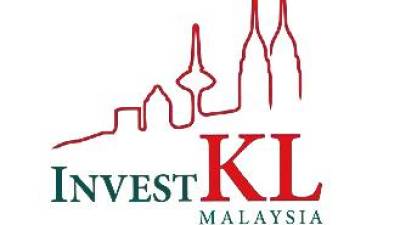 PETALING JAYA: InvestKL has secured RM3.3 billion in investments, creating 3,389 high-value regional jobs through the establishment of six global services hubs in the first half of
2024.
The investments, secured amid global challenges, reaffirm Greater Kuala Lumpur’s (Greater KL) appeal as a top investment destination, bolstered by the country’s ease of doing business, robust
infrastructure, skilled talent pool, and vibrant ecosystem driven by collaboration and innovation.
Malaysia recorded an impressive first-quarter 2024 investment progress of RM83.7 billion, a 13% increase over the same period last year, of which 47% (RM39.3 billion) are from the services sector,
marking a shift towards service-oriented investments.
Reflecting these results, InvestKL’s new investments include the establishment of a data centre by a global data centre and co-location provider from the US; a centre of excellence by a largest
premium label and packaging provider from the US: a global operation centre by a provider of integrated software solutions from the UK; an Apac global business services hub by the UK’s global
recruitment company; an EPCI execution centre by an offshore energy solutions company from Japan and a digital lab headquarters by Singapore’s foremost telecommunication provider of innovative
technologies and sustainable solutions.
InvestKL CEO Datuk Muhammad Azmi Zulkifli said in a statement, “The first-half results demonstrate InvestKL’s continued impact in solidifying Greater KL’s status as a top investment destination in
the region. This aligns well with our 2024 target to attract global services hubs with a focus on technology and cutting-edge activities that will spur high-skilled jobs for Malaysians. Through our
engagements, it is evident that more eyes are now on Malaysia, and global companies are eager to capitalise on the country’s strength to deepen their investments and broaden their regional presence
from Greater KL.”
As of today, InvestKL has attracted more than 140 global services hubs by leading companies employing more than 27,000 executives with an average monthly salary of RM17,000. InvestKL’s strategic
direction will focus on attracting global services from key sectors such as digital and technology, engineering, health tech, and renewable energy, while also emphasising human capital
development.
PETALING JAYA: InvestKL has secured RM3.3 billion in investments, creating 3,389 high-value regional jobs through the establishment of six global services hubs in the first half of
2024.
The investments, secured amid global challenges, reaffirm Greater Kuala Lumpur’s (Greater KL) appeal as a top investment destination, bolstered by the country’s ease of doing business, robust
infrastructure, skilled talent pool, and vibrant ecosystem driven by collaboration and innovation.
Malaysia recorded an impressive first-quarter 2024 investment progress of RM83.7 billion, a 13% increase over the same period last year, of which 47% (RM39.3 billion) are from the services sector,
marking a shift towards service-oriented investments.
Reflecting these results, InvestKL’s new investments include the establishment of a data centre by a global data centre and co-location provider from the US; a centre of excellence by a largest
premium label and packaging provider from the US: a global operation centre by a provider of integrated software solutions from the UK; an Apac global business services hub by the UK’s global
recruitment company; an EPCI execution centre by an offshore energy solutions company from Japan and a digital lab headquarters by Singapore’s foremost telecommunication provider of innovative
technologies and sustainable solutions.
InvestKL CEO Datuk Muhammad Azmi Zulkifli said in a statement, “The first-half results demonstrate InvestKL’s continued impact in solidifying Greater KL’s status as a top investment destination in
the region. This aligns well with our 2024 target to attract global services hubs with a focus on technology and cutting-edge activities that will spur high-skilled jobs for Malaysians. Through our
engagements, it is evident that more eyes are now on Malaysia, and global companies are eager to capitalise on the country’s strength to deepen their investments and broaden their regional presence
from Greater KL.”
As of today, InvestKL has attracted more than 140 global services hubs by leading companies employing more than 27,000 executives with an average monthly salary of RM17,000. InvestKL’s strategic
direction will focus on attracting global services from key sectors such as digital and technology, engineering, health tech, and renewable energy, while also emphasising human capital
development.
>> Continua a leggere
TM, Singtel’s Nxera break ground for state-of-the-art, AI-ready data centre campus in Johor (gio, 25 lug 2024)
 PETALING JAYA: Telekom Malaysia Bhd (TM) and Nxera, the regional data centre arm of Singtel’s Digital InfraCo unit, held a groundbreaking ceremony today for their 64MW state-of-the-art,
sustainable, hyper-connected, artificial intelligence-ready data centre campus in Iskandar Puteri, Johor
The groundbreaking comes one month after the announcement for a joint venture to develop data centres in Malaysia and uplift Johor’s digital hub status.
Digital Minister Gobind Singh Deo said, “This investment by TM and Nxera reinforces Malaysia’s position as the digital hub in Southeast Asia, further advancing the nation’s economic growth. Based
on advance estimates, Malaysia’s economy expanded 5.8% in the second quarter of 2024, and such investments are in line with projections that Malaysia’s digital economy will contribute 25.5% to the
nation’s GDP by the end of the year.
“The relationship between TM and Nxera expands to Malaysia and Singapore, with both nations being a good case study of a productive working partnership between two Asean member states.”
Johor Menteri Besar Datuk Onn Hafiz Ghazi said TM-Nxera’s upcoming data centre campus, located in Iskandar Puteri, holds particular significance as one of the Johor Singapore Special Economic
Zone’s first investment projects.
This data centre campus, he added, will serve as a catalyst for economic growth and enable businesses to harness the power of cloud computing and AI.
“We hope this will set the stage to shape a vibrant business ecosystem where more high-tech and high-value content companies will be attracted to locate their operations within the special
economic zone and give a further boost to Johor’s digital economy, said Onn Hafiz.
TM Group CEO Amar Huzaimi Md Deris said the facility exemplifies their commitment to fostering industry growth, driving innovation, and enhancing socio-economic development. “With support from the
Federal Government, and Johor state agencies and authorities, we are confident that this AI-ready data centre will equip businesses with unparalleled computing power, AI capabilities, and other
cutting-edge technologies.”
Meanwhile, Nxera and Singtel’s Digital InfraCo unit CEO Bill Chang said that as one of the largest investments in the Johor-Singapore Special Economic Zone, this state-of-the-art data centre
campus is an integral part of their mission to empower digital economies and communities in the region while ensuring energy and water resources are deployed responsibly and efficiently.
Scheduled to begin commercial operations in 2026, the cloud-enabled Tier 3 data centre campus will use liquid cooling to handle higher power density AI workloads. The facility will be designed,
built and certified to Leadership in Energy and Environmental Design standards, incorporating energy and water-efficient solutions to optimise the use of resources.
PETALING JAYA: Telekom Malaysia Bhd (TM) and Nxera, the regional data centre arm of Singtel’s Digital InfraCo unit, held a groundbreaking ceremony today for their 64MW state-of-the-art,
sustainable, hyper-connected, artificial intelligence-ready data centre campus in Iskandar Puteri, Johor
The groundbreaking comes one month after the announcement for a joint venture to develop data centres in Malaysia and uplift Johor’s digital hub status.
Digital Minister Gobind Singh Deo said, “This investment by TM and Nxera reinforces Malaysia’s position as the digital hub in Southeast Asia, further advancing the nation’s economic growth. Based
on advance estimates, Malaysia’s economy expanded 5.8% in the second quarter of 2024, and such investments are in line with projections that Malaysia’s digital economy will contribute 25.5% to the
nation’s GDP by the end of the year.
“The relationship between TM and Nxera expands to Malaysia and Singapore, with both nations being a good case study of a productive working partnership between two Asean member states.”
Johor Menteri Besar Datuk Onn Hafiz Ghazi said TM-Nxera’s upcoming data centre campus, located in Iskandar Puteri, holds particular significance as one of the Johor Singapore Special Economic
Zone’s first investment projects.
This data centre campus, he added, will serve as a catalyst for economic growth and enable businesses to harness the power of cloud computing and AI.
“We hope this will set the stage to shape a vibrant business ecosystem where more high-tech and high-value content companies will be attracted to locate their operations within the special
economic zone and give a further boost to Johor’s digital economy, said Onn Hafiz.
TM Group CEO Amar Huzaimi Md Deris said the facility exemplifies their commitment to fostering industry growth, driving innovation, and enhancing socio-economic development. “With support from the
Federal Government, and Johor state agencies and authorities, we are confident that this AI-ready data centre will equip businesses with unparalleled computing power, AI capabilities, and other
cutting-edge technologies.”
Meanwhile, Nxera and Singtel’s Digital InfraCo unit CEO Bill Chang said that as one of the largest investments in the Johor-Singapore Special Economic Zone, this state-of-the-art data centre
campus is an integral part of their mission to empower digital economies and communities in the region while ensuring energy and water resources are deployed responsibly and efficiently.
Scheduled to begin commercial operations in 2026, the cloud-enabled Tier 3 data centre campus will use liquid cooling to handle higher power density AI workloads. The facility will be designed,
built and certified to Leadership in Energy and Environmental Design standards, incorporating energy and water-efficient solutions to optimise the use of resources.
>> Continua a leggere
Malaysia’s nominal GDP in 2023 amounts to RM1.8 trillion (gio, 25 lug 2024)
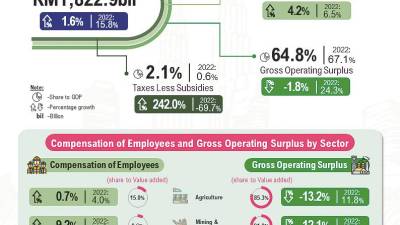 PETALING JAYA: Malaysia’s nominal gross domestic product (GDP) amounted to RM1.8 trillion in 2023, growing 1.6% compared to 15.8% in the previous year, Chief Statistician Malaysia Datuk
Seri Dr Mohd Uzir Mahidin said today.
Despite the moderated performance, he said, the economy remained resilient particularly through private final consumption expenditure that increased 6.7%. The growth, he added, was propelled by
ongoing enhancement in employment and wage through the implementation of new minimum wage of RM1,500 a month which started in May 2023.
Given the improvements in the labour market, compensation of employees (CE) recorded a steady growth of 4.2% while gross operating surplus (GOS) declined by 1.8%. The performance of the income
distribution showed a shift towards a better share of CE at 33.1% compared to 32.3% in 2022, Mohd Uzir said.
Nevertheless, GOS still contributed substantially to GDP at 64.8% although it was 2.3% lower than the previous year. The remaining component was taxes less subsidies on production and imports (net
taxes), which accounted for 2.1%.
Looking at detailed sectoral performance, the increase in the CE component, encompassing the remuneration received by employees for their labour was driven by the services, manufacturing and
construction sectors. CE in services sector grew 4.3%, supported by growth in all sub-sectors, particularly wholesale and retail trade, food & beverages and accommodation.
The manufacturing sector CE registered 3.3% growth, led by the moderation in electrical, electronic and optical products. Furthermore, CE in construction and mining & quarrying sectors rose
6.8% and 9.2%, respectively, while CE in agriculture sector showed a marginal increase of 0.7% in 2023.
The services sector was the largest contributor to the CE, represented 62.5%, followed by the manufacturing sector with 23.6% share. Collectively, these sectors made up 86.1% of overall CE,
reflecting a significant role in the economy.
While, the construction and agriculture sectors accounted for 8.1% and 3.5%, respectively. The mining & quarrying sector contributed the smallest share, 2.2% of total CE.
Mohd Uzir said the decline in GOS was primarily influenced by a sharp downturn in mining & quarrying (-12.1%), agriculture (-13.2%) and manufacturing (-5.6%) sectors.
The fall of commodity prices in 2023 has lowered profitability across these sectors, leading to a marked decrease in overall GOS. Nevertheless, the contraction was partially alleviated by the
growth in the services and construction sectors at 5.3% and 1.3%, respectively.
In terms of composition of GOS, the services sector led with a 52.9% share, followed by the manufacturing sector at 23.3%. The mining & quarrying and agriculture sectors made up 12.0% and
10.2%, respectively. Meanwhile, the construction sector accounted for 1.6% of GOS in 2023.
Net taxes, a component which represents the source of income for the government, showed remarkable growth of 242% or RM37.7 billion in 2023, attributed to the higher taxation revenue as compared
to a decrease in subsidies.
Taxes on production and imports increased by 3.1%, driven by the growth in services tax and import duty. Meanwhile, a significant drop in subsidies, at 34.2% was mainly influenced by the decline
in petroleum and diesel subsidies.
In the context of international comparison, the composition of CE in the Southeast Asian region is notably lower, accounting for less than 40% of GDP, while GOS makes up a larger share.
PETALING JAYA: Malaysia’s nominal gross domestic product (GDP) amounted to RM1.8 trillion in 2023, growing 1.6% compared to 15.8% in the previous year, Chief Statistician Malaysia Datuk
Seri Dr Mohd Uzir Mahidin said today.
Despite the moderated performance, he said, the economy remained resilient particularly through private final consumption expenditure that increased 6.7%. The growth, he added, was propelled by
ongoing enhancement in employment and wage through the implementation of new minimum wage of RM1,500 a month which started in May 2023.
Given the improvements in the labour market, compensation of employees (CE) recorded a steady growth of 4.2% while gross operating surplus (GOS) declined by 1.8%. The performance of the income
distribution showed a shift towards a better share of CE at 33.1% compared to 32.3% in 2022, Mohd Uzir said.
Nevertheless, GOS still contributed substantially to GDP at 64.8% although it was 2.3% lower than the previous year. The remaining component was taxes less subsidies on production and imports (net
taxes), which accounted for 2.1%.
Looking at detailed sectoral performance, the increase in the CE component, encompassing the remuneration received by employees for their labour was driven by the services, manufacturing and
construction sectors. CE in services sector grew 4.3%, supported by growth in all sub-sectors, particularly wholesale and retail trade, food & beverages and accommodation.
The manufacturing sector CE registered 3.3% growth, led by the moderation in electrical, electronic and optical products. Furthermore, CE in construction and mining & quarrying sectors rose
6.8% and 9.2%, respectively, while CE in agriculture sector showed a marginal increase of 0.7% in 2023.
The services sector was the largest contributor to the CE, represented 62.5%, followed by the manufacturing sector with 23.6% share. Collectively, these sectors made up 86.1% of overall CE,
reflecting a significant role in the economy.
While, the construction and agriculture sectors accounted for 8.1% and 3.5%, respectively. The mining & quarrying sector contributed the smallest share, 2.2% of total CE.
Mohd Uzir said the decline in GOS was primarily influenced by a sharp downturn in mining & quarrying (-12.1%), agriculture (-13.2%) and manufacturing (-5.6%) sectors.
The fall of commodity prices in 2023 has lowered profitability across these sectors, leading to a marked decrease in overall GOS. Nevertheless, the contraction was partially alleviated by the
growth in the services and construction sectors at 5.3% and 1.3%, respectively.
In terms of composition of GOS, the services sector led with a 52.9% share, followed by the manufacturing sector at 23.3%. The mining & quarrying and agriculture sectors made up 12.0% and
10.2%, respectively. Meanwhile, the construction sector accounted for 1.6% of GOS in 2023.
Net taxes, a component which represents the source of income for the government, showed remarkable growth of 242% or RM37.7 billion in 2023, attributed to the higher taxation revenue as compared
to a decrease in subsidies.
Taxes on production and imports increased by 3.1%, driven by the growth in services tax and import duty. Meanwhile, a significant drop in subsidies, at 34.2% was mainly influenced by the decline
in petroleum and diesel subsidies.
In the context of international comparison, the composition of CE in the Southeast Asian region is notably lower, accounting for less than 40% of GDP, while GOS makes up a larger share.
>> Continua a leggere
Sime Darby, Porsche expand assembly facility in Kulim (mer, 24 lug 2024)
 PETALING JAYA: Sime Darby Bhd and Porsche have jointly announced the expansion of Porsche’s assembly facility at Inokom, Sime Darby’s motor vehicle production and assembly facility in
Kulim, Kedah.
The local assembly facility has been expanded to 11,000 sq m to accommodate the increased capacity and introduction of a new assembly line for a second model variant, the plug-in hybrid Porsche
Cayenne S E-Hybrid Coupé. The new model variant is the first locally assembled Porsche to be exported to the Thailand market.
Sime Darby Group CEO Datuk Jeffri Salim Davidson said, “This is a significant milestone for us at Sime Darby together with our partner Porsche, in unlocking new opportunities in the Asean region
while affirming the capabilities of our highly skilled local talents. We remain steadfast in our commitment to delivering product consistency that meets the discerning demands of Porsche customers,
expanding beyond domestic market to our neighbouring country, Thailand.”
The local assembly facility for Porsche was the first of its kind outside of Europe when it was successfully opened in 2022.
Yesterday, the local assembly facility had rolled out two generations and more than 2,000 units of Porsche’s iconic sports car for five – and it is now ready for its next phase with the assembly
of its first PHEV variant and export into Thailand.
Porsche AG member of the executive board for production Albrecht Reimold said: “Porsche broke new ground when it established a local assembly facility in Malaysia in 2022. Since then, we have
achieved many significant milestones, for example when more than 2,000 locally assembled Cayennes found new homes with Malaysian families just two years after assembly commenced. Today, we prepare
for the future by considerably enhancing our site in Kulim, making sure that this first regionally exported Cayenne fulfils our customers’ demands and expectations.”
PETALING JAYA: Sime Darby Bhd and Porsche have jointly announced the expansion of Porsche’s assembly facility at Inokom, Sime Darby’s motor vehicle production and assembly facility in
Kulim, Kedah.
The local assembly facility has been expanded to 11,000 sq m to accommodate the increased capacity and introduction of a new assembly line for a second model variant, the plug-in hybrid Porsche
Cayenne S E-Hybrid Coupé. The new model variant is the first locally assembled Porsche to be exported to the Thailand market.
Sime Darby Group CEO Datuk Jeffri Salim Davidson said, “This is a significant milestone for us at Sime Darby together with our partner Porsche, in unlocking new opportunities in the Asean region
while affirming the capabilities of our highly skilled local talents. We remain steadfast in our commitment to delivering product consistency that meets the discerning demands of Porsche customers,
expanding beyond domestic market to our neighbouring country, Thailand.”
The local assembly facility for Porsche was the first of its kind outside of Europe when it was successfully opened in 2022.
Yesterday, the local assembly facility had rolled out two generations and more than 2,000 units of Porsche’s iconic sports car for five – and it is now ready for its next phase with the assembly
of its first PHEV variant and export into Thailand.
Porsche AG member of the executive board for production Albrecht Reimold said: “Porsche broke new ground when it established a local assembly facility in Malaysia in 2022. Since then, we have
achieved many significant milestones, for example when more than 2,000 locally assembled Cayennes found new homes with Malaysian families just two years after assembly commenced. Today, we prepare
for the future by considerably enhancing our site in Kulim, making sure that this first regionally exported Cayenne fulfils our customers’ demands and expectations.”
>> Continua a leggere
Honda Malaysia celebrates delivery milestones (mer, 24 lug 2024)
 KLANG: Honda Malaysia yesterday reached a historic milestone with the delivery of the 170,000th Civic and the 150,000th HR-V in Malaysia.
To celebrate this double joy, the company hosted a special car handover ceremony at Honda Botanic Auto Mall Sdn Bhd to commemorate the achievements with the owners of these popular models.
Honda Malaysia managing director and CEO Hironobu Yoshimura said Honda models continue to receive growing popularity and demand, thanks to their customers’ support.
“Now in its 11th Generation, the Civic is an iconic Honda model and has maintained its position as the non-national C-segment leader for eight consecutive years since 2016. The HR-V meanwhile, has
won the hearts of many Malaysians since its debut in Malaysia nine years ago and set a high benchmark in the compact SUV segment. With its exceptional design and advanced powertrain options, we
believe the HR-V will continue to be Malaysian’s favourite compact SUV. As we celebrate the delivery of the 170,000th Civic and 150,000th HR-V, we extend our sincere gratitude to both our customers
for being part of Honda’s journey and helping us in achieving this significant milestone,” he added.
The 170,000th Civic is a 2.0L e:HEV RS, while the 150,000th HR-V is a 1.5L e:HEV RS. Both models were delivered to their respective owners – Lim Chin Hui and Asha Waheda during the handover
ceremony. As a gesture of appreciation to mark the occasion, both owners were presented with an exclusive gift and Honda genuine accessories worth RM10,000.
In the first half of 2024, the company recorded total sales of more than 39,200 units, representing a 16% growth from the corresponding period in 2023. The HR-V, which is the most sought-after
model in the non-national compact SUV segment, is the biggest contributor with a 28% contribution to Honda Malaysia’s total sales. The second best-selling model is the City, accounting for 24% of the
total sales, followed by the CR-V with a 15% contribution.
The company also saw a rising demand for the e:HEV technology. Offered in models such as the City, City Hatchback, Civic, HR-V and CR-V, Honda Malaysia further strengthens the presence of the
e:HEV technology in the industry. The e:HEV variants contributed 13% to Honda Malaysia’s sales in the first half of 2024, marking substantial growth for Honda’s hybrid models.
KLANG: Honda Malaysia yesterday reached a historic milestone with the delivery of the 170,000th Civic and the 150,000th HR-V in Malaysia.
To celebrate this double joy, the company hosted a special car handover ceremony at Honda Botanic Auto Mall Sdn Bhd to commemorate the achievements with the owners of these popular models.
Honda Malaysia managing director and CEO Hironobu Yoshimura said Honda models continue to receive growing popularity and demand, thanks to their customers’ support.
“Now in its 11th Generation, the Civic is an iconic Honda model and has maintained its position as the non-national C-segment leader for eight consecutive years since 2016. The HR-V meanwhile, has
won the hearts of many Malaysians since its debut in Malaysia nine years ago and set a high benchmark in the compact SUV segment. With its exceptional design and advanced powertrain options, we
believe the HR-V will continue to be Malaysian’s favourite compact SUV. As we celebrate the delivery of the 170,000th Civic and 150,000th HR-V, we extend our sincere gratitude to both our customers
for being part of Honda’s journey and helping us in achieving this significant milestone,” he added.
The 170,000th Civic is a 2.0L e:HEV RS, while the 150,000th HR-V is a 1.5L e:HEV RS. Both models were delivered to their respective owners – Lim Chin Hui and Asha Waheda during the handover
ceremony. As a gesture of appreciation to mark the occasion, both owners were presented with an exclusive gift and Honda genuine accessories worth RM10,000.
In the first half of 2024, the company recorded total sales of more than 39,200 units, representing a 16% growth from the corresponding period in 2023. The HR-V, which is the most sought-after
model in the non-national compact SUV segment, is the biggest contributor with a 28% contribution to Honda Malaysia’s total sales. The second best-selling model is the City, accounting for 24% of the
total sales, followed by the CR-V with a 15% contribution.
The company also saw a rising demand for the e:HEV technology. Offered in models such as the City, City Hatchback, Civic, HR-V and CR-V, Honda Malaysia further strengthens the presence of the
e:HEV technology in the industry. The e:HEV variants contributed 13% to Honda Malaysia’s sales in the first half of 2024, marking substantial growth for Honda’s hybrid models.
>> Continua a leggere
Price index of cement higher in June: DoSM (mer, 24 lug 2024)
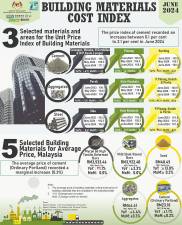 PUTRAJAYA: The unit price index of cement recorded in June this year increased between 0.1% and 2.1% in Peninsular Malaysia, Sabah, and Sarawak.
The highest increase was in Selangor, Kuala Lumpur, Malacca, and Negri Sembilan (2.1%), followed by Pahang (1.6%) and Kuching (0.1%), according to a report entitled Special For Building And
Structural Works released by the Department of Statistics Malaysia (DoSM).
In a statement, Chief Statistician Datuk Seri Dr Mohd Uzir Mahidin said the aggregates’ unit price index registered an increase between 0.4% and 0.6% for almost all areas in June 2024 compared to
the previous month.
The highest increase was recorded in Penang, Kedah, Perlis and Kota Kinabalu (0.6% respectively).
Mohd Uzir also mentioned that the monthly comparison showed a slight increase in the unit price index of steel for several areas.
The highest increases were in Sibu (0.4%), Kota Kinabalu (0.2%), and Penang, Kedah, and Perlis (0.1%).
Meanwhile, the unit price index of materials decreased in Selangor, Kuala Lumpur, Malacca and Negri Sembilan (-0.8%), followed by Terengganu & Kelantan (-0.1%).
The monthly comparison of steel and metal sections showed that the unit price index remained unchanged in June 2024 in Peninsular Malaysia, Sabah, and Sarawak.
However, there was a slight decrease in these materials’ price index in Penang, Kedah and Perlis (-0.7%), followed by Kuching (-0.6%) and Kota Kinabalu (-0.2%).
An annual comparison for the period of June 2023 and June 2024 showed that the unit price index of cement increased between 0.4% and 4.7% for all areas in Peninsular Malaysia, Sabah and
Sarawak.
The highest increase was recorded in Selangor, Kuala Lumpur, Malacca and Negri Sembilan (4.7%), followed by Tawau (2.2%), Penang, Kedah and Perlis (2%) and Pahang (1.6%).
An annual comparison of the average price per unit of steel decreased from -0.1% to -5.3% in June 2024 compared to the same month last year for almost all areas in Peninsular Malaysia, Sabah and
Sarawak.
However, the material price index increased slightly in Kuching (0.5%) and Johor (0.7%).
Mohd Uzir elaborated that the average price of cement (Ordinary Portland) recorded a marginal increase (0.3%) with an average price of RM23.10 per 50kg bag as compared to May 2024 (RM23.04 per
50kg bag).
Meanwhile, the average price per unit of steel, consisting of mild steel round bars and Mycon 60 high tensile deformed bars, remained unchanged compared to May 2024, with an average price of
RM3,730.49 per tonne.
In June 2024, the month-on-month BCI with steel bars for all building categories increased between 0.1% and 2% for almost all areas in Peninsular Malaysia.
The highest increase was in Selangor, Kuala Lumpur, Malacca and Negri Sembilan for the timber piling category (2%).
However, there was a slight decrease between -0.1% to -0.3% for BCI with steel bars for several building categories in Johor, Terengganu and Kelantan.
BCI with steel bars in Sabah also showed a slight increase of 0.1% for almost all building categories in Kota Kinabalu and Tawau.
Meanwhile, the index for almost all other building categories in Sandakan remained unchanged.
A monthly comparison of BCI with steel bars in Sarawak registered a slight decrease between -0.1% to -0.2% in June 2024 for almost all categories of buildings in Kuching.
PUTRAJAYA: The unit price index of cement recorded in June this year increased between 0.1% and 2.1% in Peninsular Malaysia, Sabah, and Sarawak.
The highest increase was in Selangor, Kuala Lumpur, Malacca, and Negri Sembilan (2.1%), followed by Pahang (1.6%) and Kuching (0.1%), according to a report entitled Special For Building And
Structural Works released by the Department of Statistics Malaysia (DoSM).
In a statement, Chief Statistician Datuk Seri Dr Mohd Uzir Mahidin said the aggregates’ unit price index registered an increase between 0.4% and 0.6% for almost all areas in June 2024 compared to
the previous month.
The highest increase was recorded in Penang, Kedah, Perlis and Kota Kinabalu (0.6% respectively).
Mohd Uzir also mentioned that the monthly comparison showed a slight increase in the unit price index of steel for several areas.
The highest increases were in Sibu (0.4%), Kota Kinabalu (0.2%), and Penang, Kedah, and Perlis (0.1%).
Meanwhile, the unit price index of materials decreased in Selangor, Kuala Lumpur, Malacca and Negri Sembilan (-0.8%), followed by Terengganu & Kelantan (-0.1%).
The monthly comparison of steel and metal sections showed that the unit price index remained unchanged in June 2024 in Peninsular Malaysia, Sabah, and Sarawak.
However, there was a slight decrease in these materials’ price index in Penang, Kedah and Perlis (-0.7%), followed by Kuching (-0.6%) and Kota Kinabalu (-0.2%).
An annual comparison for the period of June 2023 and June 2024 showed that the unit price index of cement increased between 0.4% and 4.7% for all areas in Peninsular Malaysia, Sabah and
Sarawak.
The highest increase was recorded in Selangor, Kuala Lumpur, Malacca and Negri Sembilan (4.7%), followed by Tawau (2.2%), Penang, Kedah and Perlis (2%) and Pahang (1.6%).
An annual comparison of the average price per unit of steel decreased from -0.1% to -5.3% in June 2024 compared to the same month last year for almost all areas in Peninsular Malaysia, Sabah and
Sarawak.
However, the material price index increased slightly in Kuching (0.5%) and Johor (0.7%).
Mohd Uzir elaborated that the average price of cement (Ordinary Portland) recorded a marginal increase (0.3%) with an average price of RM23.10 per 50kg bag as compared to May 2024 (RM23.04 per
50kg bag).
Meanwhile, the average price per unit of steel, consisting of mild steel round bars and Mycon 60 high tensile deformed bars, remained unchanged compared to May 2024, with an average price of
RM3,730.49 per tonne.
In June 2024, the month-on-month BCI with steel bars for all building categories increased between 0.1% and 2% for almost all areas in Peninsular Malaysia.
The highest increase was in Selangor, Kuala Lumpur, Malacca and Negri Sembilan for the timber piling category (2%).
However, there was a slight decrease between -0.1% to -0.3% for BCI with steel bars for several building categories in Johor, Terengganu and Kelantan.
BCI with steel bars in Sabah also showed a slight increase of 0.1% for almost all building categories in Kota Kinabalu and Tawau.
Meanwhile, the index for almost all other building categories in Sandakan remained unchanged.
A monthly comparison of BCI with steel bars in Sarawak registered a slight decrease between -0.1% to -0.2% in June 2024 for almost all categories of buildings in Kuching.
>> Continua a leggere
Malaysia has made great progress in attracting tech investments: 500 Global head (mer, 24 lug 2024)
 KUALA LUMPUR: Malaysia recorded a total of 9.48 million visitors from January to May this year, an increase of two million visitors compared to the same period in 2023.
500 Global managing partner Khailee Ng said tourist arrivals to Malaysia are increasing, highlighting why major global corporations such as Microsoft, Cloud AI and Infineon choose to invest in the
country.
He said the nation has made significant progress by having the world’s largest production site of silicon carbides, with Infineon recording up to RM22.8 billion (US$5 billion).
“There are also projects from China, Europe, the United States, and other countries that are being set up not just in Penang but also in Johor, Sabah and Sarawak.
“Events like this will also bring the community into the opportunities and insights of the Malaysian investments,“ he said in his speech at the opening of the Tech in Asia Conference 2024
today.
The two-day conference, powered by Mystartup by Cradle, as attracted tech enthusiasts, investors and entrepreneurs from across Southeast Asia. The event , underpinned by Mystartup’s commitment to
fostering startup growth and innovation, is a pivotal moment for the region’s tech ecosystem.
The conference opened with a keynote address by Cradle Fund Sdn Bhd CEO Datuk Seri Mohd Yusof Sulaiman, who highlighted the transformative impact of startups on the Malaysian economy. “The role of
Mystartup by Cradle is key in nurturing homegrown talent and supporting scalable business models through funding, mentorship and market access,“ he said.
Malaysia Semiconductor Industry Association president Datuk Seri Wong Siew Hai shared his insights on Malaysia’s semiconductors opportunity, which focuses on leveraging opportunities to enhance
the industry and localising semiconductors in the Malaysian industry.
The conference features panel sessions and workshops addressing critical issues in the tech industry.
Sessions such as “Scaling Startups in Southeast Asia” and “The Rise of Malaysia Fintech Scene” provided valuable insights into market trends, regulatory challenges and growth strategies.
A recurring theme at the conference is the emphasis on sustainability, opportunities and inclusivity in technology. –
KUALA LUMPUR: Malaysia recorded a total of 9.48 million visitors from January to May this year, an increase of two million visitors compared to the same period in 2023.
500 Global managing partner Khailee Ng said tourist arrivals to Malaysia are increasing, highlighting why major global corporations such as Microsoft, Cloud AI and Infineon choose to invest in the
country.
He said the nation has made significant progress by having the world’s largest production site of silicon carbides, with Infineon recording up to RM22.8 billion (US$5 billion).
“There are also projects from China, Europe, the United States, and other countries that are being set up not just in Penang but also in Johor, Sabah and Sarawak.
“Events like this will also bring the community into the opportunities and insights of the Malaysian investments,“ he said in his speech at the opening of the Tech in Asia Conference 2024
today.
The two-day conference, powered by Mystartup by Cradle, as attracted tech enthusiasts, investors and entrepreneurs from across Southeast Asia. The event , underpinned by Mystartup’s commitment to
fostering startup growth and innovation, is a pivotal moment for the region’s tech ecosystem.
The conference opened with a keynote address by Cradle Fund Sdn Bhd CEO Datuk Seri Mohd Yusof Sulaiman, who highlighted the transformative impact of startups on the Malaysian economy. “The role of
Mystartup by Cradle is key in nurturing homegrown talent and supporting scalable business models through funding, mentorship and market access,“ he said.
Malaysia Semiconductor Industry Association president Datuk Seri Wong Siew Hai shared his insights on Malaysia’s semiconductors opportunity, which focuses on leveraging opportunities to enhance
the industry and localising semiconductors in the Malaysian industry.
The conference features panel sessions and workshops addressing critical issues in the tech industry.
Sessions such as “Scaling Startups in Southeast Asia” and “The Rise of Malaysia Fintech Scene” provided valuable insights into market trends, regulatory challenges and growth strategies.
A recurring theme at the conference is the emphasis on sustainability, opportunities and inclusivity in technology. –
>> Continua a leggere
MN Holdings secures RM136.2m substation engineering contract for data centre in Johor (mer, 24 lug 2024)
 PETALING JAYA: Underground utilities and substation engineering specialist MN Holdings Berhad has secured a substation engineering contract worth RM136.2 million in Johor.
The company’s wholly owned subsidiary MN Power Transmission Sdn Bhd (MN Power) received and accepted a letter of award from a customer that provides data centre services (Customer A).
The contract scope of work comprises design, supply, installation, maintenance, testing and commissioning for a new 275 kilovolt (kV) consumer landing station (CLS), including main building works,
guardhouse and external works, and dismantling and relocating the existing 33/11kV Containerised CLS to the new 33/11kV Interim CLS for Customer A under Package 2.
The latest contract win is in addition to a previous contract won under Package 1 to perform earthworks, retaining walls and piling works for the same CLS, with a contract sum of RM7.1
million.
The contract shall commence in July 2024 and target for completion by June 2025.
MN Holdings executive director Datuk Dang Siong Diang said with more data centres in the pipeline in Johor and Selangor, the company is prepared to bid for more projects in the data centre
category.
“We don’t see a slowdown in power infrastructure projects in the coming years as Malaysia has attracted more than 50 data centres within the last two years, putting it on track to become a new
data centre hub in South-East Asia.
“Inclusive of the latest contract win, in total, MN Holdings has clinched RM291.5 million worth of on-going data centre contracts that will keep the Company busy for the next two years. Apart from
contracts from data centres, the company also secured projects from large scale solar (LSS) project owners. In the second quarter, the company had bagged an engineering, procurement, construction and
commissioning (EPCC) contract for a LSS photovoltaic plant in Kedah with contract sum of RM26.0 million, as well as a contract worth RM1.26 million to supply, deliver, install, testing and
commissioning solar photovoltaic system for the rehabilitation works of four solar hybrid stations at Perak, Kelantan and Johor” he added.
Moving forward, MN Holdings expects its performance to be bolstered by both ongoing projects and new projects that are expected to be secured. In addition to its involvement in the power industry,
MN Holdings is also actively participating in upgrading water and sewerage infrastructure. This sector is driven by the government’s focus on addressing non-revenue water challenges and the
increasing demand for water to support the data centre industry.
Recently, MN Semantra Sdn Bhd, a subsidiary company of MN Holdings had secured a RM13.0 million contract for drainage and sewerage works for flood mitigation using the pipe jacking method at
Seremban.
With the latest job win, its outstanding order book increased to a total value of RM568.5 million, which is expected to be progressively completed between 2024 and 2025. Out of the RM568.5 million
order book, RM546.7 million are projects from the power and gas industries while the remaining RM21.8 million from the water and sewerage industry.
PETALING JAYA: Underground utilities and substation engineering specialist MN Holdings Berhad has secured a substation engineering contract worth RM136.2 million in Johor.
The company’s wholly owned subsidiary MN Power Transmission Sdn Bhd (MN Power) received and accepted a letter of award from a customer that provides data centre services (Customer A).
The contract scope of work comprises design, supply, installation, maintenance, testing and commissioning for a new 275 kilovolt (kV) consumer landing station (CLS), including main building works,
guardhouse and external works, and dismantling and relocating the existing 33/11kV Containerised CLS to the new 33/11kV Interim CLS for Customer A under Package 2.
The latest contract win is in addition to a previous contract won under Package 1 to perform earthworks, retaining walls and piling works for the same CLS, with a contract sum of RM7.1
million.
The contract shall commence in July 2024 and target for completion by June 2025.
MN Holdings executive director Datuk Dang Siong Diang said with more data centres in the pipeline in Johor and Selangor, the company is prepared to bid for more projects in the data centre
category.
“We don’t see a slowdown in power infrastructure projects in the coming years as Malaysia has attracted more than 50 data centres within the last two years, putting it on track to become a new
data centre hub in South-East Asia.
“Inclusive of the latest contract win, in total, MN Holdings has clinched RM291.5 million worth of on-going data centre contracts that will keep the Company busy for the next two years. Apart from
contracts from data centres, the company also secured projects from large scale solar (LSS) project owners. In the second quarter, the company had bagged an engineering, procurement, construction and
commissioning (EPCC) contract for a LSS photovoltaic plant in Kedah with contract sum of RM26.0 million, as well as a contract worth RM1.26 million to supply, deliver, install, testing and
commissioning solar photovoltaic system for the rehabilitation works of four solar hybrid stations at Perak, Kelantan and Johor” he added.
Moving forward, MN Holdings expects its performance to be bolstered by both ongoing projects and new projects that are expected to be secured. In addition to its involvement in the power industry,
MN Holdings is also actively participating in upgrading water and sewerage infrastructure. This sector is driven by the government’s focus on addressing non-revenue water challenges and the
increasing demand for water to support the data centre industry.
Recently, MN Semantra Sdn Bhd, a subsidiary company of MN Holdings had secured a RM13.0 million contract for drainage and sewerage works for flood mitigation using the pipe jacking method at
Seremban.
With the latest job win, its outstanding order book increased to a total value of RM568.5 million, which is expected to be progressively completed between 2024 and 2025. Out of the RM568.5 million
order book, RM546.7 million are projects from the power and gas industries while the remaining RM21.8 million from the water and sewerage industry.
>> Continua a leggere
AME Elite and AME REIT announce RM119.5m industrial properties transaction in Iskandar Malaysia (mer, 24 lug 2024)
 JOHOR BAHRU: AME Elite Consortium Berhad and I REIT Managers Sdn Bhd, the management company of AME Real Estate Investment Trust (AME REIT), jointly announced the proposed transaction of four
fully-leased industrial properties in Iskandar Malaysia worth RM119.5 million; AME REIT will acquire these properties from its sponsor AME Elite for cash considerations.
The four properties — two located in i-TechValley and two in i-Park@Senai Airport City — have a combined agreed lettable area (ALA) of 391,872 square feet (sq. ft.). The properties consist of
single-story detached factories with mezzanine offices and ancillary buildings, currently leased to reputable tenants.
AME Elite Consortium Berhad executive director and Group CEO Dylan Tan Teck Eng said, “Malaysia’s improving economy and increasing foreign direct investment (FDI) in the industrial sector,
particularly in Iskandar Malaysia where our industrial parks are strategically located, present significant advantages and growth opportunities.
Our strategic partnership with AME REIT, which includes its right of first refusal for AME Elite-owned properties for five years after AME REIT’s listing in 2022, allows us to capitalise on the
favourable market potential created by higher FDI.
Furthermore, divesting properties to AME REIT enables us to optimise our capital allocation towards further expansion of our industrial parks, while our tenants benefit from the expertise of a
dedicated industrial REIT team in managing their long-term needs. This mutually beneficial arrangement ensures a steady pipeline of potential assets for AME REIT and aligns our interests for mutual
growth.”
The proceeds from AME Elite’s divestment will partially fund the ongoing development of its i-TechValley project in SILC, a 169.8-acre industrial park with an estimated gross development value
(GDV) of RM1.5 billion. Remaining proceeds will also be allocated towards future industrial property development and investment projects, including land acquisitions and joint ventures.
The transaction is expected to generate a pro forma gain on disposal of approximately RM22.9 million for AME Elite, net of tax and minority interest, resulting in an illustrative 24.1% increase in
earnings per share to 18.08 sen from 14.57 sen for the financial year ended March 31, 2024.
I REIT Managers Sdn Bhd CEO and executive director Chan Wai Leo said, “The acquisitions of industrial properties from our sponsor underscores our continued efforts to expand our portfolio and
reward our unitholders with growth in income distribution.
The exercise will further strengthen our position as a prominent industrial-focused REIT, with an expanded portfolio of 41 industrial and industrial-related properties. This acquisition drive, our
second since listing, will enhance our financial performance in FY2025 and beyond.
In addition to purchasing properties from our sponsor, our acquisition strategy also encompasses identifying compatible third-party assets in the central and northern regions of Peninsular
Malaysia.”
The acquisitions will increase AME REIT’s pro forma total asset value by 16.7% to RM828.8 million from RM710.2 million as at March 31, 2024, and its ALA by 20.9% to 2.3 million sq. ft. from 1.9
million sq. ft. If the proposed acquisitions are fully financed via Islamic financing facilities, AME REIT’s pro forma gearing ratio is estimated to increase to 27.0%.
All properties are fully leased to tenants such as Ametalin Sdn Bhd, AAC Technologies (Malaysia) Sdn Bhd, Resmed Malaysia Operations Sdn Bhd, and a healthcare-related manufacturer, with long-term
leases ranging from 5 to 10 years, with renewal options. The diverse tenant mix of the acquired properties further enhances the stability and resilience of AME REIT’s portfolio, ensuring a steady
income flow and potential for increased distributions to unitholders.
The transaction is structured as a sale and purchase agreement between RHB Trustees Berhad, the trustee of AME REIT, and subsidiaries of AME Elite, with the purchase consideration settled entirely
in cash. The transaction is expected to be completed in phases between the first and third quarters of 2025.
The acquisitions are subject to approvals from non-interested unitholders of AME REIT and non-interested shareholders of AME Elite at their respective Extraordinary General Meetings, as well as
relevant regulatory bodies. The transaction is expected to contribute positively to earnings of AME REIT and AME Elite in the financial year ending March 31, 2025 (FY2025) and beyond.
The latest transaction marks AME REIT’s second acquisition from AME Elite, following its initial post-listing purchase of three industrial properties in Iskandar Malaysia from AME Elite for RM69.3
million in October 2023.
JOHOR BAHRU: AME Elite Consortium Berhad and I REIT Managers Sdn Bhd, the management company of AME Real Estate Investment Trust (AME REIT), jointly announced the proposed transaction of four
fully-leased industrial properties in Iskandar Malaysia worth RM119.5 million; AME REIT will acquire these properties from its sponsor AME Elite for cash considerations.
The four properties — two located in i-TechValley and two in i-Park@Senai Airport City — have a combined agreed lettable area (ALA) of 391,872 square feet (sq. ft.). The properties consist of
single-story detached factories with mezzanine offices and ancillary buildings, currently leased to reputable tenants.
AME Elite Consortium Berhad executive director and Group CEO Dylan Tan Teck Eng said, “Malaysia’s improving economy and increasing foreign direct investment (FDI) in the industrial sector,
particularly in Iskandar Malaysia where our industrial parks are strategically located, present significant advantages and growth opportunities.
Our strategic partnership with AME REIT, which includes its right of first refusal for AME Elite-owned properties for five years after AME REIT’s listing in 2022, allows us to capitalise on the
favourable market potential created by higher FDI.
Furthermore, divesting properties to AME REIT enables us to optimise our capital allocation towards further expansion of our industrial parks, while our tenants benefit from the expertise of a
dedicated industrial REIT team in managing their long-term needs. This mutually beneficial arrangement ensures a steady pipeline of potential assets for AME REIT and aligns our interests for mutual
growth.”
The proceeds from AME Elite’s divestment will partially fund the ongoing development of its i-TechValley project in SILC, a 169.8-acre industrial park with an estimated gross development value
(GDV) of RM1.5 billion. Remaining proceeds will also be allocated towards future industrial property development and investment projects, including land acquisitions and joint ventures.
The transaction is expected to generate a pro forma gain on disposal of approximately RM22.9 million for AME Elite, net of tax and minority interest, resulting in an illustrative 24.1% increase in
earnings per share to 18.08 sen from 14.57 sen for the financial year ended March 31, 2024.
I REIT Managers Sdn Bhd CEO and executive director Chan Wai Leo said, “The acquisitions of industrial properties from our sponsor underscores our continued efforts to expand our portfolio and
reward our unitholders with growth in income distribution.
The exercise will further strengthen our position as a prominent industrial-focused REIT, with an expanded portfolio of 41 industrial and industrial-related properties. This acquisition drive, our
second since listing, will enhance our financial performance in FY2025 and beyond.
In addition to purchasing properties from our sponsor, our acquisition strategy also encompasses identifying compatible third-party assets in the central and northern regions of Peninsular
Malaysia.”
The acquisitions will increase AME REIT’s pro forma total asset value by 16.7% to RM828.8 million from RM710.2 million as at March 31, 2024, and its ALA by 20.9% to 2.3 million sq. ft. from 1.9
million sq. ft. If the proposed acquisitions are fully financed via Islamic financing facilities, AME REIT’s pro forma gearing ratio is estimated to increase to 27.0%.
All properties are fully leased to tenants such as Ametalin Sdn Bhd, AAC Technologies (Malaysia) Sdn Bhd, Resmed Malaysia Operations Sdn Bhd, and a healthcare-related manufacturer, with long-term
leases ranging from 5 to 10 years, with renewal options. The diverse tenant mix of the acquired properties further enhances the stability and resilience of AME REIT’s portfolio, ensuring a steady
income flow and potential for increased distributions to unitholders.
The transaction is structured as a sale and purchase agreement between RHB Trustees Berhad, the trustee of AME REIT, and subsidiaries of AME Elite, with the purchase consideration settled entirely
in cash. The transaction is expected to be completed in phases between the first and third quarters of 2025.
The acquisitions are subject to approvals from non-interested unitholders of AME REIT and non-interested shareholders of AME Elite at their respective Extraordinary General Meetings, as well as
relevant regulatory bodies. The transaction is expected to contribute positively to earnings of AME REIT and AME Elite in the financial year ending March 31, 2025 (FY2025) and beyond.
The latest transaction marks AME REIT’s second acquisition from AME Elite, following its initial post-listing purchase of three industrial properties in Iskandar Malaysia from AME Elite for RM69.3
million in October 2023.
>> Continua a leggere
AME REIT reports 6.7% growth in net property income to RM11.4 million in 1Q25 (mer, 24 lug 2024)
 JOHOR BAHRU: Industrial REIT AME Real Estate Investment Trust (AME REIT) recorded a 6.7% increase in net property income (NPI) to RM11.4 million in the first quarter ended June 30, 2024 (1Q25)
from RM10.7 million in the previous corresponding quarter (1Q24).
The growth was driven by a 8.2% rise in rental income to RM12.3 million from RM11.4 million previously, attributed to contribution from an industrial property acquired in October 2023, as well as
positive rental reversions achieved across AME REIT’s portfolio.
After accounting for non-property expenses, namely management fees, trustee’s fees, financing costs, and other adjustments, the total distributable income amounted to RM9.7 million in 1Q25 versus
RM9.4 million previously.
AME REIT will reward unitholders by distributing 99.9% of the total distributable income of RM9.7 million for 1Q25, equivalent to a distribution per unit (DPU) of 1.84 sen. The distribution is
payable on Aug 30, 2024 to unitholders of record as of Aug 8, 2024.
I REIT Managers Sdn Bhd CEO and executive director Chan Wai Leo said: “Our 1Q25 performance reflects our continued operational excellence and effective execution of strategic initiatives. Notably,
we maintained high occupancy across our portfolio and secured positive rental reversions on our lease renewals in the previous year, highlighting our resilient position in the Malaysian industrial
property market.”
Looking ahead, he added they are confident in the sustained growth potential of the Malaysian industrial sector, driven by increasing foreign direct investment and a stabilising ringgit.
“We remain focused on maximising long-term value for our unitholders through strategic acquisitions and effective asset management,” he said.
AME REIT’s current portfolio consists of 34 industrial properties with an agreed-upon lettable area of 1.9 million sq ft and 3 industrial-related properties of workers’ dormitories. As at June 30,
2024, AME REIT has RM686 million worth of properties under management.
AME REIT’s properties are mainly situated across three industrial parks of AME Group in Iskandar Malaysia, namely i-Park @ Indahpura in Kulai, i-Park @ Senai Airport City in Senai, and i-Park @
SILC in Iskandar Puteri.
JOHOR BAHRU: Industrial REIT AME Real Estate Investment Trust (AME REIT) recorded a 6.7% increase in net property income (NPI) to RM11.4 million in the first quarter ended June 30, 2024 (1Q25)
from RM10.7 million in the previous corresponding quarter (1Q24).
The growth was driven by a 8.2% rise in rental income to RM12.3 million from RM11.4 million previously, attributed to contribution from an industrial property acquired in October 2023, as well as
positive rental reversions achieved across AME REIT’s portfolio.
After accounting for non-property expenses, namely management fees, trustee’s fees, financing costs, and other adjustments, the total distributable income amounted to RM9.7 million in 1Q25 versus
RM9.4 million previously.
AME REIT will reward unitholders by distributing 99.9% of the total distributable income of RM9.7 million for 1Q25, equivalent to a distribution per unit (DPU) of 1.84 sen. The distribution is
payable on Aug 30, 2024 to unitholders of record as of Aug 8, 2024.
I REIT Managers Sdn Bhd CEO and executive director Chan Wai Leo said: “Our 1Q25 performance reflects our continued operational excellence and effective execution of strategic initiatives. Notably,
we maintained high occupancy across our portfolio and secured positive rental reversions on our lease renewals in the previous year, highlighting our resilient position in the Malaysian industrial
property market.”
Looking ahead, he added they are confident in the sustained growth potential of the Malaysian industrial sector, driven by increasing foreign direct investment and a stabilising ringgit.
“We remain focused on maximising long-term value for our unitholders through strategic acquisitions and effective asset management,” he said.
AME REIT’s current portfolio consists of 34 industrial properties with an agreed-upon lettable area of 1.9 million sq ft and 3 industrial-related properties of workers’ dormitories. As at June 30,
2024, AME REIT has RM686 million worth of properties under management.
AME REIT’s properties are mainly situated across three industrial parks of AME Group in Iskandar Malaysia, namely i-Park @ Indahpura in Kulai, i-Park @ Senai Airport City in Senai, and i-Park @
SILC in Iskandar Puteri.
>> Continua a leggere
Bank Negara, govt efforts to stabilise ringgit yielding results: Maybank IB (mer, 24 lug 2024)
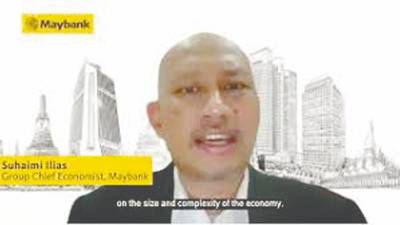 KUALA LUMPUR: Efforts by Bank Negara Malaysia (BNM) to stabilise the ringgit and rebuild external reserves through repatriation and conversion are progressing positively.
Maybank Investment Bank Bhd (Maybank IB) group chief economist Suhaimi Ilias said government and central bank efforts to stabilise the local currency and rebuild reserves with support from
government-linked companies are also progressing.
“The improvement in the country’s current account surplus in the first quarter this year, compared to the fourth quarter of last year, was largely driven by higher inflows of investment income,”
he said in a media briefing on the market outlook of the second half of 2024 today.
He said this strongly suggests that Malaysian corporates are actually responding positively to the government’s efforts to encourage repatriation and conversion.
The ringgit has been among the best regional performers over the last three months, buoyed by a mix of favourable domestic and external factors, Suhaimi said, adding that the ringgit has
stabilised, trading below 4.70 against the US dollar for almost two weeks.
He said the market is anticipating the US Federal Reserve to cut interest rates as early as September.
Maybank IB expects BNM to maintain the Overnight Policy Rate at 3%, given that inflation may average 2.4% in 2024 and 3% next year. “The dynamics on interest rates between the two central banks
should further support the ringgit,” Suhaimi said.
He added: “Maybank IB anticipates the ringgit will end this year at RM4.60 against the US dollar, which aligns with our forecasts since the first quarter.”
KUALA LUMPUR: Efforts by Bank Negara Malaysia (BNM) to stabilise the ringgit and rebuild external reserves through repatriation and conversion are progressing positively.
Maybank Investment Bank Bhd (Maybank IB) group chief economist Suhaimi Ilias said government and central bank efforts to stabilise the local currency and rebuild reserves with support from
government-linked companies are also progressing.
“The improvement in the country’s current account surplus in the first quarter this year, compared to the fourth quarter of last year, was largely driven by higher inflows of investment income,”
he said in a media briefing on the market outlook of the second half of 2024 today.
He said this strongly suggests that Malaysian corporates are actually responding positively to the government’s efforts to encourage repatriation and conversion.
The ringgit has been among the best regional performers over the last three months, buoyed by a mix of favourable domestic and external factors, Suhaimi said, adding that the ringgit has
stabilised, trading below 4.70 against the US dollar for almost two weeks.
He said the market is anticipating the US Federal Reserve to cut interest rates as early as September.
Maybank IB expects BNM to maintain the Overnight Policy Rate at 3%, given that inflation may average 2.4% in 2024 and 3% next year. “The dynamics on interest rates between the two central banks
should further support the ringgit,” Suhaimi said.
He added: “Maybank IB anticipates the ringgit will end this year at RM4.60 against the US dollar, which aligns with our forecasts since the first quarter.”
>> Continua a leggere
AEON Credit bags Outstanding Community Engagement Award (mer, 24 lug 2024)
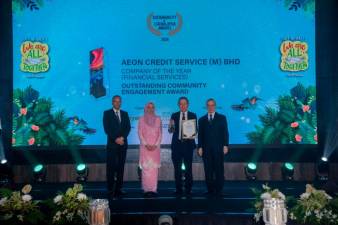 KUALA LUMPUR: AEON Credit Service (M) Bhd (AEON Credit) has bagged the Outstanding Community Engagement Award at the Sustainability and CSR Malaysia Awards 2024, reaffirming the group’s support in
community welfare and sustainable development initiatives.
Managing director Daisuke Maeda said the company is honored to receive the award, recognising its commitment to creating positive impacts through diverse community engagement programs.
“These initiatives benefit local communities and demonstrate our dedication to being a responsible corporate citizen,“ he said in a statement.
He said this accolade not only reinforces the group’s purpose of bringing finance closer to everyone but also further accelerates its three-year sustainability roadmap progress.
“Anchored by four key focuses, including environmental sustainability, strengthening financial inclusion, promoting societal well-being as well as upholding governance standards, we aim to become
a leading environmental, social and governance (ESG) company,“ he said.
AEON Credit is dedicated to environmental stewardship through impactful initiatives such as coastal cleanups, mangrove planting and green financing aimed at mitigating climate change.
During the year, AEON Credit invested RM1.9 million in the AEON Credit Biodiversity Afforestation Project, a collaborative initiative spanning three years.
This project aims to plant 10,000 indigenous endangered species in Kinta Nature Park by September 2024.
This project not only conserves the degraded biodiversity but also contributes to the group’s efforts in carbon emission offset, estimated 30,7119 tCO2 equivalent to be claimed for the next 20
years.
As a financial service provider, AEON Credit remains committed to advancing financial inclusion.
Over the past three years, AEON Credit invested RM2 million in digital learning tools and fostered digital literacy through the Malaysian AEON Foundation Smart Classroom Project, benefiting 20
schools.
This initiative aims to enhance digital learning and provide equal educational opportunities for students.
Additionally, the group has awarded scholarships to deserving students in public universities, supporting their academic pursuits, and easing financial burdens on their families.
Furthermore, AEON Credit continues to enhance its digital platform and products to meet the evolving needs of customers and improve access for underserved communities, which is in line with its
financial inclusion commitment.
The launch of AEON Bank exemplifies its commitment to advancing the adoption of digital solutions.
The Sustainability and CSR Malaysia Award 2024 is organised by CSR Malaysia Publications to honor corporations in Malaysia that have excelled as change agents in the socio-economic transformation
of the country.
Winners of the Sustainability and CSR Malaysia Awards were evaluated based on clear CSR purpose and goals, impact, frequency of events, contribution amounts, transparency in reporting, creative
implementation, strength of the CSR team as well as the sincerity and effectiveness of each initiative.
KUALA LUMPUR: AEON Credit Service (M) Bhd (AEON Credit) has bagged the Outstanding Community Engagement Award at the Sustainability and CSR Malaysia Awards 2024, reaffirming the group’s support in
community welfare and sustainable development initiatives.
Managing director Daisuke Maeda said the company is honored to receive the award, recognising its commitment to creating positive impacts through diverse community engagement programs.
“These initiatives benefit local communities and demonstrate our dedication to being a responsible corporate citizen,“ he said in a statement.
He said this accolade not only reinforces the group’s purpose of bringing finance closer to everyone but also further accelerates its three-year sustainability roadmap progress.
“Anchored by four key focuses, including environmental sustainability, strengthening financial inclusion, promoting societal well-being as well as upholding governance standards, we aim to become
a leading environmental, social and governance (ESG) company,“ he said.
AEON Credit is dedicated to environmental stewardship through impactful initiatives such as coastal cleanups, mangrove planting and green financing aimed at mitigating climate change.
During the year, AEON Credit invested RM1.9 million in the AEON Credit Biodiversity Afforestation Project, a collaborative initiative spanning three years.
This project aims to plant 10,000 indigenous endangered species in Kinta Nature Park by September 2024.
This project not only conserves the degraded biodiversity but also contributes to the group’s efforts in carbon emission offset, estimated 30,7119 tCO2 equivalent to be claimed for the next 20
years.
As a financial service provider, AEON Credit remains committed to advancing financial inclusion.
Over the past three years, AEON Credit invested RM2 million in digital learning tools and fostered digital literacy through the Malaysian AEON Foundation Smart Classroom Project, benefiting 20
schools.
This initiative aims to enhance digital learning and provide equal educational opportunities for students.
Additionally, the group has awarded scholarships to deserving students in public universities, supporting their academic pursuits, and easing financial burdens on their families.
Furthermore, AEON Credit continues to enhance its digital platform and products to meet the evolving needs of customers and improve access for underserved communities, which is in line with its
financial inclusion commitment.
The launch of AEON Bank exemplifies its commitment to advancing the adoption of digital solutions.
The Sustainability and CSR Malaysia Award 2024 is organised by CSR Malaysia Publications to honor corporations in Malaysia that have excelled as change agents in the socio-economic transformation
of the country.
Winners of the Sustainability and CSR Malaysia Awards were evaluated based on clear CSR purpose and goals, impact, frequency of events, contribution amounts, transparency in reporting, creative
implementation, strength of the CSR team as well as the sincerity and effectiveness of each initiative.
>> Continua a leggere
Cybersecurity firms responsible for their products’ reliability, stability: LGMS chairman (gio, 25 lug 2024)
 KUALA LUMPUR: Cybersecurity companies must prioritise deploying updates and software patches in stages to prevent widespread issues such as the recent global information technology (IT)
outage and ensure smoother transitions.
Moreover, cybersecurity firms must be prepared for incidents caused by cybercriminals or their own cybersecurity vendors.
The chairman of local cybersecurity services company LGMS Bhd, Fong Choong Fook, said preparedness and cautious deployment are key to maintaining robust and reliable IT systems.
“Cybersecurity is no longer an IT issue alone. It is a business survival issue. Evaluate and deploy multiple products and solutions, whether hardware or software, to diversify risks.
“Also, regularly conduct cyber drills to simulate the event of computer failure, so to be better prepared for the inevitable,” he told SunBiz.
“This involves protecting against phishing campaigns from criminals pretending to offer official fixes and setting up standard operating procedures to prevent such failures.”
Fong said the global IT outage on July 19 was not caused by blackhat hackers or malware but by a botched update from cybersecurity company CrowdStrike. “That’s right. The ones who were supposed to
protect you from such incidents were the ones who made it happen.”
He said the primary responsibility in this case rested with CrowdStrike, and as a cybersecurity company, it should have conducted more thorough testing before releasing updates to the public.
“The likelihood of this sort of incident in the future depends on how security firms learn from this lesson. Cybersecurity firms bear an enormous responsibility to ensure their products’
stability,” Fong said.
The update to CrowdStrike’s Falcon endpoint detection and response software was so faulty that it caused Windows devices to “bluescreen” and experience fatal failures that even multiple reboots
could not fix.
Fixing the problem was difficult, and IT personnel had to manually intervene with each affected device.
The resolution was even more complicated if the device was protected by BitLocker, Windows’s full-drive encryption solution.
Several news agencies, cited by The Wall Street Journal, reported that a Microsoft spokesman blamed European Union regulators for contributing to the incident, as they required Microsoft to
give kernel access to third-party anti-malware vendors.
CrowdStrike’s share price on Nasdaq dropped by more than 10%, likely due to the company’s failure to properly test the update before releasing it to customers.
The incident revealed weaknesses in how businesses and government bodies manage IT infrastructure processes worldwide.
KUALA LUMPUR: Cybersecurity companies must prioritise deploying updates and software patches in stages to prevent widespread issues such as the recent global information technology (IT)
outage and ensure smoother transitions.
Moreover, cybersecurity firms must be prepared for incidents caused by cybercriminals or their own cybersecurity vendors.
The chairman of local cybersecurity services company LGMS Bhd, Fong Choong Fook, said preparedness and cautious deployment are key to maintaining robust and reliable IT systems.
“Cybersecurity is no longer an IT issue alone. It is a business survival issue. Evaluate and deploy multiple products and solutions, whether hardware or software, to diversify risks.
“Also, regularly conduct cyber drills to simulate the event of computer failure, so to be better prepared for the inevitable,” he told SunBiz.
“This involves protecting against phishing campaigns from criminals pretending to offer official fixes and setting up standard operating procedures to prevent such failures.”
Fong said the global IT outage on July 19 was not caused by blackhat hackers or malware but by a botched update from cybersecurity company CrowdStrike. “That’s right. The ones who were supposed to
protect you from such incidents were the ones who made it happen.”
He said the primary responsibility in this case rested with CrowdStrike, and as a cybersecurity company, it should have conducted more thorough testing before releasing updates to the public.
“The likelihood of this sort of incident in the future depends on how security firms learn from this lesson. Cybersecurity firms bear an enormous responsibility to ensure their products’
stability,” Fong said.
The update to CrowdStrike’s Falcon endpoint detection and response software was so faulty that it caused Windows devices to “bluescreen” and experience fatal failures that even multiple reboots
could not fix.
Fixing the problem was difficult, and IT personnel had to manually intervene with each affected device.
The resolution was even more complicated if the device was protected by BitLocker, Windows’s full-drive encryption solution.
Several news agencies, cited by The Wall Street Journal, reported that a Microsoft spokesman blamed European Union regulators for contributing to the incident, as they required Microsoft to
give kernel access to third-party anti-malware vendors.
CrowdStrike’s share price on Nasdaq dropped by more than 10%, likely due to the company’s failure to properly test the update before releasing it to customers.
The incident revealed weaknesses in how businesses and government bodies manage IT infrastructure processes worldwide.
>> Continua a leggere
FMM urges govt to provide double tax deduction to SMEs for IR4 adoption (mer, 24 lug 2024)
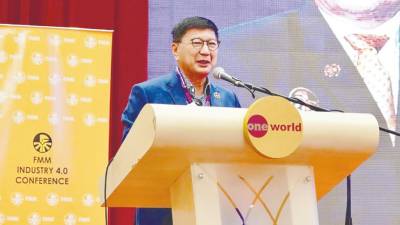 KUALA LUMPUR: The Federation of Malaysian Manufacturers (FMM) today urged the government to provide double tax deduction to support domestic industries’ adoption of Industry 4.0 (IR4) and
upscale their innovation in organising, managing, and controlling the value chain life cycle.
FMM president Tan Sri Soh Thian Lai said the government, together with related agencies and stakeholders, should set up an environmental, social, and governance (ESG) fund of RM2 billion, which
FMM has been discussing for the past few years.
“This is particularly relevant for SMEs (small and medium-sized enterprises). In Malaysia, SMEs comprise 97.5% of our businesses, which is nearly 1.3 million companies. Of these, 97.5% are micro
SMEs, whereby around 900,000 to 1 million companies, 87% are considered micro SMEs.
Apart from the ESG fund, we also need to have a national automation and IR4 fund to further support micro and SMEs on the path towards full digital transformation across the entire product
lifecycle,” he told reporters at the FMM Industry 4.0 Conference 2024 here today.
FMM proposed that the government provide double tax deduction for domestic companies that adopt IR4 and digitalisation technology in artificial intelligence (AI), big data, autonomous robots and
manufacturing robotic systems, industrial Internet of Things, cloud computing, cybersecurity, system integration, factory automation system and smart warehouse management system.
The double tax reduction should cover tax relief that can be used to offset taxable income for approved IR4 and digitalisation projects by the government.
Further, FMM proposed that the government introduce new tax incentives for the establishment of manufacturing artificial intelligence (AI) and robotics systems on the production floor.
It also suggested that the government provide an accelerated capital allowance for AI and robotics systems up to a qualifying expenditure of RM5 million for SMEs that implement manufacturing AI
and robotics systems starting Jan 1, 2025.
To support local SMEs and accelerate industry adoption of IR4 and the digitalisation process, FMM proposed that banks offer technology adoption financing with a lower interest rate of 2% on a loan
for a minimum tenure of five years payback.
Touching on 5G, Soh said domestic industries are unwilling to invest in 5G for their factories, citing high cost as the main reason.
“If the government could offer double tax deduction for this type of investment, it would significantly encourage them. Secondly, when the Ministry of Investment, Trade and Industry issues
manufacturing licences to multinational companies or domestic investors, they should require new factories to be equipped with 5G. To encourage this and attract more foreign and local companies, the
government could offer double tax deduction.
“This way, all new factories would be 5G-compliant. Currently, upgrading thousands of existing factories to 5G is costly, and the government lacks the funds to cover this in industrial zones,“ Soh
said.
Touching on financial assistance, he said that while SMEs need government assistance to advance modern technologies in their operations, domestic banks also play a crucial role in steering
companies in Malaysia to adopt IR4 technologies.
“Currently, many banks are interested in providing loans to all factories, including SMEs. However, the interest rates can be high. Some banks offer lower rates, but these rates are still
relatively high. If the government could provide corporate guarantees through agencies like Credit Guarantee Corporation Malaysia Bhd, banks could then offer interest rates of 2-3%.
“Currently, bank loan interest rates range from 5-7%. Lower rates, supported by government guarantees, would encourage more SMEs in IR4 adoption,“ Soh said.
On skilled talents needed in the IR4 ecosystem, he said the government should set up a national apprenticeship fund to help SMEs automate and reduce reliance on foreign workers.
“We have about 2.5 or 2.6 million foreign workers in Malaysia. These are legal workers. We do not know the number of illegal workers working here.
“If Malaysia aims to become a high-income and highly productive nation, automation and IR4.0 technologies, such as artificial intelligence, are crucial. These advancements will help industries
modernise their processes and attract better talent,” Soh said.
KUALA LUMPUR: The Federation of Malaysian Manufacturers (FMM) today urged the government to provide double tax deduction to support domestic industries’ adoption of Industry 4.0 (IR4) and
upscale their innovation in organising, managing, and controlling the value chain life cycle.
FMM president Tan Sri Soh Thian Lai said the government, together with related agencies and stakeholders, should set up an environmental, social, and governance (ESG) fund of RM2 billion, which
FMM has been discussing for the past few years.
“This is particularly relevant for SMEs (small and medium-sized enterprises). In Malaysia, SMEs comprise 97.5% of our businesses, which is nearly 1.3 million companies. Of these, 97.5% are micro
SMEs, whereby around 900,000 to 1 million companies, 87% are considered micro SMEs.
Apart from the ESG fund, we also need to have a national automation and IR4 fund to further support micro and SMEs on the path towards full digital transformation across the entire product
lifecycle,” he told reporters at the FMM Industry 4.0 Conference 2024 here today.
FMM proposed that the government provide double tax deduction for domestic companies that adopt IR4 and digitalisation technology in artificial intelligence (AI), big data, autonomous robots and
manufacturing robotic systems, industrial Internet of Things, cloud computing, cybersecurity, system integration, factory automation system and smart warehouse management system.
The double tax reduction should cover tax relief that can be used to offset taxable income for approved IR4 and digitalisation projects by the government.
Further, FMM proposed that the government introduce new tax incentives for the establishment of manufacturing artificial intelligence (AI) and robotics systems on the production floor.
It also suggested that the government provide an accelerated capital allowance for AI and robotics systems up to a qualifying expenditure of RM5 million for SMEs that implement manufacturing AI
and robotics systems starting Jan 1, 2025.
To support local SMEs and accelerate industry adoption of IR4 and the digitalisation process, FMM proposed that banks offer technology adoption financing with a lower interest rate of 2% on a loan
for a minimum tenure of five years payback.
Touching on 5G, Soh said domestic industries are unwilling to invest in 5G for their factories, citing high cost as the main reason.
“If the government could offer double tax deduction for this type of investment, it would significantly encourage them. Secondly, when the Ministry of Investment, Trade and Industry issues
manufacturing licences to multinational companies or domestic investors, they should require new factories to be equipped with 5G. To encourage this and attract more foreign and local companies, the
government could offer double tax deduction.
“This way, all new factories would be 5G-compliant. Currently, upgrading thousands of existing factories to 5G is costly, and the government lacks the funds to cover this in industrial zones,“ Soh
said.
Touching on financial assistance, he said that while SMEs need government assistance to advance modern technologies in their operations, domestic banks also play a crucial role in steering
companies in Malaysia to adopt IR4 technologies.
“Currently, many banks are interested in providing loans to all factories, including SMEs. However, the interest rates can be high. Some banks offer lower rates, but these rates are still
relatively high. If the government could provide corporate guarantees through agencies like Credit Guarantee Corporation Malaysia Bhd, banks could then offer interest rates of 2-3%.
“Currently, bank loan interest rates range from 5-7%. Lower rates, supported by government guarantees, would encourage more SMEs in IR4 adoption,“ Soh said.
On skilled talents needed in the IR4 ecosystem, he said the government should set up a national apprenticeship fund to help SMEs automate and reduce reliance on foreign workers.
“We have about 2.5 or 2.6 million foreign workers in Malaysia. These are legal workers. We do not know the number of illegal workers working here.
“If Malaysia aims to become a high-income and highly productive nation, automation and IR4.0 technologies, such as artificial intelligence, are crucial. These advancements will help industries
modernise their processes and attract better talent,” Soh said.
>> Continua a leggere
FMM: Increase Industry Digitalisation Transformation Scheme to RM5 billion (mer, 24 lug 2024)
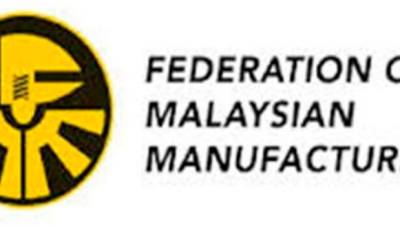 KUALA LUMPUR: The government should consider increasing the Industry Digitalisation Transformation Scheme (IDTS) fund size to RM5 billion from the current RM1 billion in Budget 2025 to
support and encourage domestic industries to adopt Industry 4.0 (IR4) technologies.
Federation of Malaysian Manufacturers (FMM) president Tan Sri Soh Thian Lai said the proposed higher allocation would aid industries, particularly SMEs that are still struggling to adopt IR4 in
their manufacturing operations.
“Currently, IDTS is only RM1 billion and under the Madani framework, there is a RM2 billion fund size. We have about 100,00 manufacturing companies in Malaysia and, as such, we need to increase
the fund size to RM5 billion,“ Soh said at the FMM Industry 4.0 Conference 2024 here today.
He said 95% to 98% of domestic companies are micro and small and medium enterprises and, therefore, it is important to restructure the country’s economy to encourage more medium-sized companies to
grow into larger ones. This will make smart manufacturing and automation more feasible.
“We have no time to waste. We need to adopt smart manufacturing immediately because our neighbouring competitors are aggressively embracing this transformation,“ Soh said.
Touching on the New Industrial Master Plan 2030 (NIMP 2030), Soh said FMM views the policy as the key to building Malaysia’s industrial capacity and resilience for the long term.
He added that under NIMP 2030, FMM will be partnering with 29 companies to create a strong technology ecosystem to support the government’s initiative to transform 3,000 companies into smart
factories.
“Based on 3,000 companies each spending about RM500,000, the total investment required would be approximately RM1.5 billion. We need to bring in more system integrators who can offer competitive
pricing in terms of transforming these companies into smart factories,“ Soh said when asked about the costs needed for IR4 adoption.
FMM vice-president Jacob Lee Chor Kok said NIMP 2030 lays out a clear course for Malaysia over the next seven years until 2030 to keep the country’s manufacturing sector and related services
competitive on a global level.
“The master plan is geared towards moving Malaysia’s manufacturing sector up the value chain to more high-technology, value-added and complex products and develop the national technological
capabilities which would be instrumental in support the high-technology manufacturing economy,“ he added.
KUALA LUMPUR: The government should consider increasing the Industry Digitalisation Transformation Scheme (IDTS) fund size to RM5 billion from the current RM1 billion in Budget 2025 to
support and encourage domestic industries to adopt Industry 4.0 (IR4) technologies.
Federation of Malaysian Manufacturers (FMM) president Tan Sri Soh Thian Lai said the proposed higher allocation would aid industries, particularly SMEs that are still struggling to adopt IR4 in
their manufacturing operations.
“Currently, IDTS is only RM1 billion and under the Madani framework, there is a RM2 billion fund size. We have about 100,00 manufacturing companies in Malaysia and, as such, we need to increase
the fund size to RM5 billion,“ Soh said at the FMM Industry 4.0 Conference 2024 here today.
He said 95% to 98% of domestic companies are micro and small and medium enterprises and, therefore, it is important to restructure the country’s economy to encourage more medium-sized companies to
grow into larger ones. This will make smart manufacturing and automation more feasible.
“We have no time to waste. We need to adopt smart manufacturing immediately because our neighbouring competitors are aggressively embracing this transformation,“ Soh said.
Touching on the New Industrial Master Plan 2030 (NIMP 2030), Soh said FMM views the policy as the key to building Malaysia’s industrial capacity and resilience for the long term.
He added that under NIMP 2030, FMM will be partnering with 29 companies to create a strong technology ecosystem to support the government’s initiative to transform 3,000 companies into smart
factories.
“Based on 3,000 companies each spending about RM500,000, the total investment required would be approximately RM1.5 billion. We need to bring in more system integrators who can offer competitive
pricing in terms of transforming these companies into smart factories,“ Soh said when asked about the costs needed for IR4 adoption.
FMM vice-president Jacob Lee Chor Kok said NIMP 2030 lays out a clear course for Malaysia over the next seven years until 2030 to keep the country’s manufacturing sector and related services
competitive on a global level.
“The master plan is geared towards moving Malaysia’s manufacturing sector up the value chain to more high-technology, value-added and complex products and develop the national technological
capabilities which would be instrumental in support the high-technology manufacturing economy,“ he added.
>> Continua a leggere
Gross fixed capital formation rises to RM314.5 billion in 2023 (mer, 24 lug 2024)
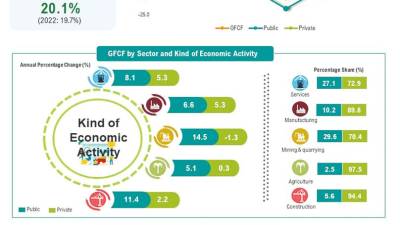 PETALING JAYA: Malaysia’s gross fixed capital formation (GFCF) recorded a value of RM314.5 billion at constant prices in 2023 compared to RM298.2 billion in 2022, according to the
Department of Statistics, Malaysia today.
The combination of global economic pressures, domestic policy adjustments, sector-specific challenges, and financial conditions significantly contributed to the moderate in GFCF growth in Malaysia
in 2023.
Chief Statistician Malaysia, Datuk Seri Dr Mohd Uzir Mahidin said, “GFCF remained the second largest component of GDP with a share of 20.1% of the total economy. GFCF grew 5.5% in 2023 compared to
6.8% in the previous year.”
He added that all major activities showed an improvement in 2023, especially investment in fixed assets in services and manufacturing activities.
“The strong performance of services activity was driven by transport & storage and information & communications and wholesale and retail trade sub-activities, which increased by 9.9% and
8.9%, respectively in 2023,” he said.
Meanwhile, manufacturing activity grew at 5.5% (2022: 10%) in 2023. The moderate growth was influenced by food, beverages and tobacco at 8.9% (2022: 14.7%), electrical, electronic & optical
products and transport equipment at 6.8% (2022: 9.3%) and petroleum, chemical, rubber and plastic products at 4.5% (2022: 8.7%).
The GFCF for mining & quarrying activity grew at 2.9% in 2023 compared to 1.8% in 2022. Agriculture activity grew at a slower pace of 0.4% (2022: 1.1%) in 2023. The marginal growth was
influenced by the decrease of rubber and oil palm sub-activity at 5.4% (2022: -4.3%).
Additionally, construction activity moderated to 2.7% compared to 3.4% in the previous year.
Structure was the largest contributor to GFCF by type of assets, accounting for 50.1% (2022: 49.8%), followed by ICT equipment and other machinery & equipment, with a contribution of 28.6%
(2022: 28.3%), while intellectual property products contributed 12.8% (2022: 13.3%).
GFCF by sector was dominated by the private sector (77.2%), which grew modestly by 4.6% (2022: 7.2%), while public sector (share: 22.8%) expanded to 8.6% compared to 5.3% in the preceding
year.
Mohd Uzir said services activity was the major contributor to the GFCF of the private sector with 63.9% compared to 63.6% in 2022. This was followed by manufacturing activity which contributed
23%. Meanwhile, other activities accounted for 13.1% of the total GFCF of the private sector.
GFCF of the public sector was led by services activity, with a contribution of 80.5% followed by mining & quarrying 9.9% and manufacturing 8.8%).
Among other Asean member countries, Indonesia and Singapore recorded GFCF growthh of 7.6% and 4.9% in 2023 respectively. In addition, fixed asset investment in Thailand experienced slower growth
of 1.4% compared to 6.7% in 2022.
PETALING JAYA: Malaysia’s gross fixed capital formation (GFCF) recorded a value of RM314.5 billion at constant prices in 2023 compared to RM298.2 billion in 2022, according to the
Department of Statistics, Malaysia today.
The combination of global economic pressures, domestic policy adjustments, sector-specific challenges, and financial conditions significantly contributed to the moderate in GFCF growth in Malaysia
in 2023.
Chief Statistician Malaysia, Datuk Seri Dr Mohd Uzir Mahidin said, “GFCF remained the second largest component of GDP with a share of 20.1% of the total economy. GFCF grew 5.5% in 2023 compared to
6.8% in the previous year.”
He added that all major activities showed an improvement in 2023, especially investment in fixed assets in services and manufacturing activities.
“The strong performance of services activity was driven by transport & storage and information & communications and wholesale and retail trade sub-activities, which increased by 9.9% and
8.9%, respectively in 2023,” he said.
Meanwhile, manufacturing activity grew at 5.5% (2022: 10%) in 2023. The moderate growth was influenced by food, beverages and tobacco at 8.9% (2022: 14.7%), electrical, electronic & optical
products and transport equipment at 6.8% (2022: 9.3%) and petroleum, chemical, rubber and plastic products at 4.5% (2022: 8.7%).
The GFCF for mining & quarrying activity grew at 2.9% in 2023 compared to 1.8% in 2022. Agriculture activity grew at a slower pace of 0.4% (2022: 1.1%) in 2023. The marginal growth was
influenced by the decrease of rubber and oil palm sub-activity at 5.4% (2022: -4.3%).
Additionally, construction activity moderated to 2.7% compared to 3.4% in the previous year.
Structure was the largest contributor to GFCF by type of assets, accounting for 50.1% (2022: 49.8%), followed by ICT equipment and other machinery & equipment, with a contribution of 28.6%
(2022: 28.3%), while intellectual property products contributed 12.8% (2022: 13.3%).
GFCF by sector was dominated by the private sector (77.2%), which grew modestly by 4.6% (2022: 7.2%), while public sector (share: 22.8%) expanded to 8.6% compared to 5.3% in the preceding
year.
Mohd Uzir said services activity was the major contributor to the GFCF of the private sector with 63.9% compared to 63.6% in 2022. This was followed by manufacturing activity which contributed
23%. Meanwhile, other activities accounted for 13.1% of the total GFCF of the private sector.
GFCF of the public sector was led by services activity, with a contribution of 80.5% followed by mining & quarrying 9.9% and manufacturing 8.8%).
Among other Asean member countries, Indonesia and Singapore recorded GFCF growthh of 7.6% and 4.9% in 2023 respectively. In addition, fixed asset investment in Thailand experienced slower growth
of 1.4% compared to 6.7% in 2022.
>> Continua a leggere
Miti launches Witi initiative to empower women entrepreneurs (mar, 23 lug 2024)
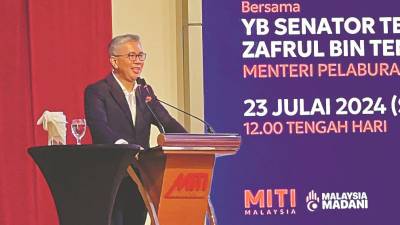 KUALA LUMPUR: The Women in Trade and Industry (Witi) programme, an initiative under the Investment, Trade and Industry Ministry (Miti), will ensure that women entrepreneurs are not left
behind in Asean’s economic progress.
Minister Tengku Datuk Seri Zafrul Tengku Abdul Aziz said Witi, a collaboration between the ministry and the Malaysian Women’s and Family Affairs Organisation (Hawa Malaysia), aims to enhance the
capacity and capabilities of women in the industrial and export sectors.
“This initiative is in line with what the ministry want to do as Asean chairman next year to ensure women’s involvement in the economy at the Asean level,“ he told reporters after Miti and its
agencies’ monthly assembly and the launch of the Witi Council here today.
The implementation of this programme aligns with the Madani Policy and the National Women’s Policy in ensuring that Malaysian women have equal opportunities and capacities to advance in the global
economy.
The Witi programme will be implemented nationwide in partnership with Hawa Malaysia, established in March 2023. Through various programmes and initiatives, Hawa Malaysia seeks to address the
barriers and challenges faced by women in the economic sector.
The strategic collaboration between Miti and Hawa Malaysia aims to serve as a platform for women entrepreneurs to engage in the trade and industrial sectors, enhancing their knowledge and
capacity, to support national economic development.
Miti will conduct the Witi programme by providing training and support to women interested in venturing into trade and industry. TThe initiative is open to various groups of women, including
entrepreneurs, startup owners, small and medium enterprise operators, youth, and the B40 and M40 groups.
Tengku Zafrul said women’s empowerment is key to achieving dynamic and inclusive economic growth.
“One of the missions under the New Industrial Master Plan 2030 is to ensure economic security and inclusivity that encompasses women’s empowerment. Thus, capacity building for women in the trade
and industrial sectors through the Witi programme not only helps women reach their potential but also drives the national economy to greater heights.”
The programme will also involve collaboration with lending agencies and grant providers to help women entrepreneurs secure the financial resources they need.
By exposing participants to company formation, financial management, business strategies, and cultivating company culture, the programme aims to equip them with the knowledge and skills to succeed
in trade and industry.
Tengku Zafrul said Miti is committed to continuously supporting and empowering Malaysian women in their efforts to contribute to economic sustainability. “With the implementation of this Witi
programme, Miti is confident that Malaysian women will drive the global economy and achieve even greater success.”
Tengku Zafrul says women’s empowerment is key to achieving dynamic and inclusive economic growth.
KUALA LUMPUR: The Women in Trade and Industry (Witi) programme, an initiative under the Investment, Trade and Industry Ministry (Miti), will ensure that women entrepreneurs are not left
behind in Asean’s economic progress.
Minister Tengku Datuk Seri Zafrul Tengku Abdul Aziz said Witi, a collaboration between the ministry and the Malaysian Women’s and Family Affairs Organisation (Hawa Malaysia), aims to enhance the
capacity and capabilities of women in the industrial and export sectors.
“This initiative is in line with what the ministry want to do as Asean chairman next year to ensure women’s involvement in the economy at the Asean level,“ he told reporters after Miti and its
agencies’ monthly assembly and the launch of the Witi Council here today.
The implementation of this programme aligns with the Madani Policy and the National Women’s Policy in ensuring that Malaysian women have equal opportunities and capacities to advance in the global
economy.
The Witi programme will be implemented nationwide in partnership with Hawa Malaysia, established in March 2023. Through various programmes and initiatives, Hawa Malaysia seeks to address the
barriers and challenges faced by women in the economic sector.
The strategic collaboration between Miti and Hawa Malaysia aims to serve as a platform for women entrepreneurs to engage in the trade and industrial sectors, enhancing their knowledge and
capacity, to support national economic development.
Miti will conduct the Witi programme by providing training and support to women interested in venturing into trade and industry. TThe initiative is open to various groups of women, including
entrepreneurs, startup owners, small and medium enterprise operators, youth, and the B40 and M40 groups.
Tengku Zafrul said women’s empowerment is key to achieving dynamic and inclusive economic growth.
“One of the missions under the New Industrial Master Plan 2030 is to ensure economic security and inclusivity that encompasses women’s empowerment. Thus, capacity building for women in the trade
and industrial sectors through the Witi programme not only helps women reach their potential but also drives the national economy to greater heights.”
The programme will also involve collaboration with lending agencies and grant providers to help women entrepreneurs secure the financial resources they need.
By exposing participants to company formation, financial management, business strategies, and cultivating company culture, the programme aims to equip them with the knowledge and skills to succeed
in trade and industry.
Tengku Zafrul said Miti is committed to continuously supporting and empowering Malaysian women in their efforts to contribute to economic sustainability. “With the implementation of this Witi
programme, Miti is confident that Malaysian women will drive the global economy and achieve even greater success.”
Tengku Zafrul says women’s empowerment is key to achieving dynamic and inclusive economic growth.
>> Continua a leggere





